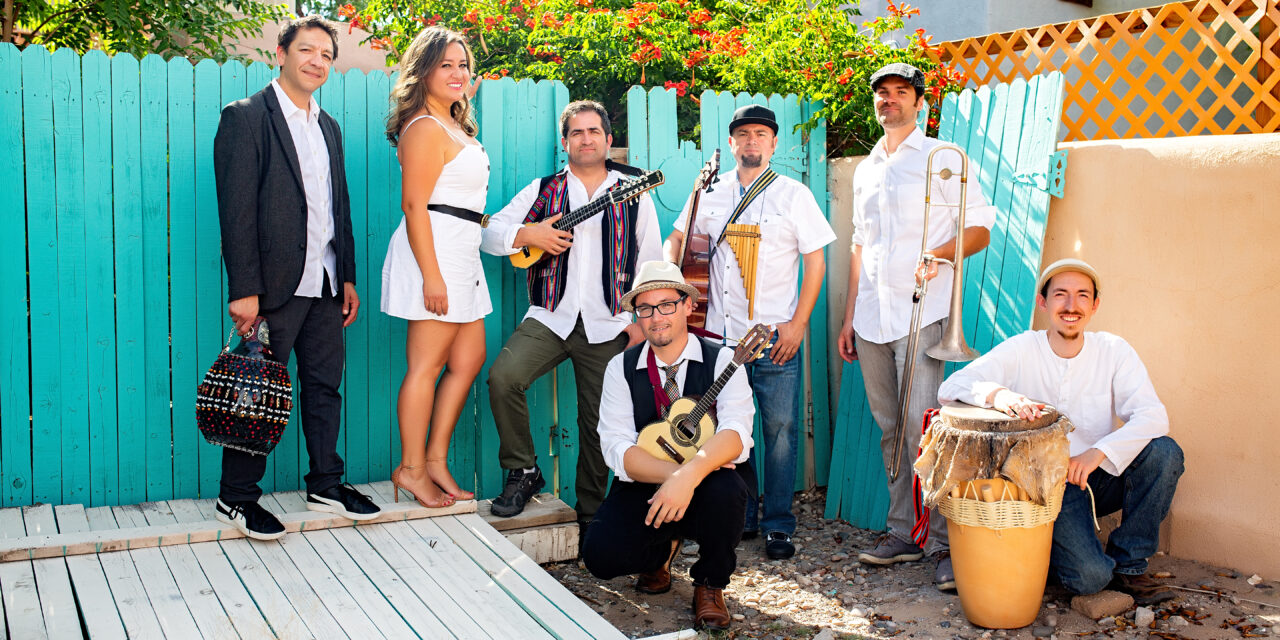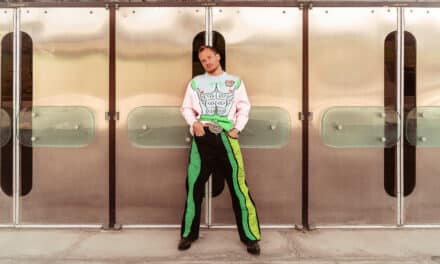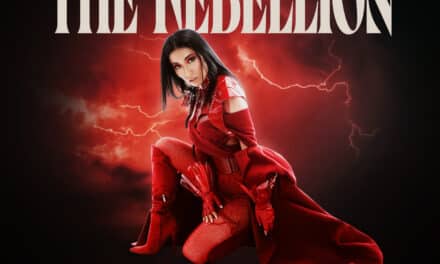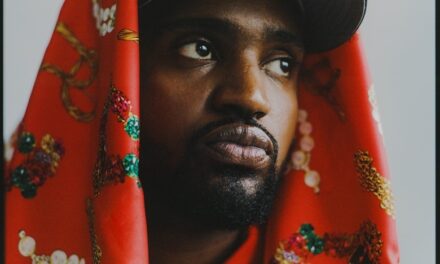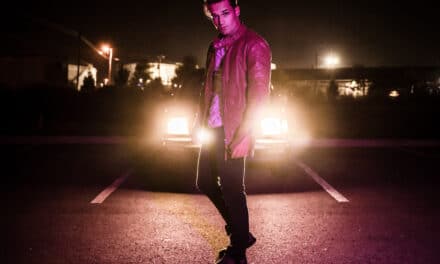Can you make progress with your eyes trained on the past? Baracutanga multi-instrumentalist and bandleader Kilko Paz would say, “yes.” This seemingly paradoxical notion lies at the center of Volver Atrás, the sophomore album from Baracutanga, out October 8 via Symphonic. The Latin folk-fusion sextet shares “Culebra Mala” to announce the release — a unified response against the poison of xenophobia.
The Spanish phrase volver atrás means to turn back, but Paz explains that, in the context of the album, “It’s a way of moving forward. It’s putting the past in front of you as a reference.” The band borrows this concept from the Aymara, an indigenous people of the Andes who see the past as being in front of us, because it’s what we can see, while the future is behind us because it’s unknown. Therefore, the past must be used to navigate the future.
Tell us about the genesis of your project. How did you get to where you are now?
The core concept of Volver Atras lies in the past, it is a way to move into the future with the past in front of you. The answers that we are so desperately looking for have been already answered and lay in the past. The concept of “progress” it is actually destroying our planet, our home, and that is because we move forward ignoring the past completely.
What does music and being an artist mean to you?
For Baracutanga, music is a beautiful way to bring people together from all places, backgrounds, and life experiences to dance, listen, and think/act upon the messages of songs that we play. Music has been a way for us to channel a spirit of protest, to communicate stories with difficult messages, to communicate colorful shades of emotions, and to give an aid to those that seem to be voiceless in the face of injustice. As a band, we are a group of artists who have a responsibility to get the message right and to orate that message in a compelling way that allows for people to dance. Together, the members of Baracutanga think through these – sometimes complicated – issues, and tell our thoughts and stories through our original combination of North and South American musical influences, rhythms, and instrumentation.
What are some sources of inspiration for your lyrics and storytelling?
Many of our songs shine a light on various immigration issues, racism, xenophobia, and violence that is found within the United States. Since the band is comprised of members that hail from the US, Bolivia, Peru, and Ecuador, there are personal experiences and related experiences to tell through our music. We also write music based on digging deep into where one comes from (culturally, in terms of family, etc.) and the emotional longing that comes from that deep digging.
Who is an artist that you look up to more than others today?
We have as inspiration artists like Lila Downs, La Santa Cecilia, Grupo Fantasma, Manu Chao, Sargento García, Totó la Momposina, Kevin Johansen, Savia Andina, inti Illimani, among others
All time favorite record?
Impossible to identify just one 😉
Tell us about your latest release and how it came about
Our latest release, “Culebra Mala”, is one of the singles from our upcoming album “Volver Atrás”. Along with the song, we released a music video. The original idea for Culebra Mala came from our trumpet player, Paul Gonzales. He had the whole form of the track laid out in a simple MIDI-rendered recording. When he brought it to a writing session rehearsal, we collectively tweaked it into something that has more of our original sound. It seemed everyone in the band contributed a bit of something to the song – tweaked the horn lines, added breaks, added different rhythmic emphasis in the different sections, even having a stacked choir of voices toward the end of the song… We tried out a lot of different things to see what works and what doesn’t. That’s the way that we write songs, though: most of the time, each member of the group has a little bit of an idea to pitch in so that we can baracutang-ize the basic idea someone brings to the table. Lyrically, Jackie had the idea of showing the effects of harassment and victimization of a person due to the differences in their race, ethnicity, and where they’re from. The lyrics are written through the perspective of the victim’s inner voice, which is a personal way of showing the poisonous effects of xenophobia.
You seem to be fusing several musical genres. What inspires your sound?
We research a lot when we write songs and it is a collaborative process. Since we all come from different backgrounds, this process gets really exiting and interesting. We like to identify completely different (in theory) music styles that might have similar rhythmic patterns, and merge them together. We attempt to look for inspiration in native ancient sounds and rhythmic patterns, in order to fuse them with modern elements
What are some things you do to deal with anxiety and creative blocks?
As musicians and artists have to meet deadlines, keep up expectations, produce content, keep relevant within the social media sphere of things, and keep playing out, anxiety can be a difficult thing to overcome. Thankfully, the members of Baracutanga work very well together. Personality-wise, we have a closeness and spirit of collaboration that (from our observations) seems to be rare in the music world. This, in and of itself, is a way to secure our positivity in the face of anxiety. Another way of combating anxiety is seeing and remembering the effects of our music. Once we remember that our messages are meaningful and see the responses of the crowds that we play for, it seems the anxious feelings melt away. Our music is meant for all people to dance and listen to. It’s also important to remember that our music is also helping others combat anxiety. That’s a great and encouraging thing to think about.
Sometimes, creative blocks just require time to overcome. Letting ideas stew in a drafts folder for a few weeks or raw recorded ideas sitting on your phone for a few weeks then coming back to the idea later is something that we’re perfectly ok with. Other times, creative blocks are broken by the collaborative nature of our writing process. That’s one of the big advantages to the diverse nature of our songwriting process: we have these world-class musicians with different ways of approaching music composition and songwriting, it always gets to a place where experimenting ends up becoming fun. Many times, we run into an idea accidentally, and that accident turns into an entire section of a song. Being open to others’ ideas and trying those ideas to better structure a song creates a fun atmosphere of collective creative problem solving. Having a no-consequence writing atmosphere like that really helps the stream of musical ideas flow.
Where do you see yourself in 5 years?
We’d love to be able to do a South American tour in 5 years.
Your style is very original and elaborate. How do you take care of your aesthetics?
It’s really awesome to hear the words “very original” describe our music – so, thank you for that. Over the years, we’ve worked hard to maintain the characteristics of our sound. It seems something that makes our live shows very special is that most everyone in the band is a multi-instrumentalist. For example: our guitarist plays accordion, keyboard, charango, and cavaquinho, among other instruments; our frontline bass player also plays Andean flutes (quena and zampoñas); our trombonist plays synthesizer and auxiliary percussion. And on and on. I think this is one of the keys to maintaining our sound is finding what works for live performance. Another key that I consider important is that we have a good understanding of the rhythms that we use. Generally, we don’t write tunes with just one rhythmic focus. It’s rare that we write an entire song that’s JUST built upon a cumbia rhythm or JUST a samba reggae. Rather, we use a handful of rhythms to section off different parts of the song. This gives the song rhythmic diversity and different musical intensity levels throughout the song. Maintaining that kind of multi-rhythmic song architecture is crucial for our sound.
What was the most daunting moment in your career so far?
Working for 2 years on a new CD, with a lot of effort, heart and dedication and suddenly, a global pandemic hits
What is the best advice you’ve ever gotten?
Find your own sound
Where do you think the next game changer will be in the music industry and entertainment scene?
Regionally, I could say that Albuquerque, NM is becoming a place that is ripening into an entertainment hub – though, I think it’s far from the progress of bigger cities. Nashville has been putting out a lot of great, diverse musical artists and songwriters, lately. And I think that Nashville will reach the point where it will definitely have more and more – if not the most – influence over shaping the entertainment industry in coming years. The recipe for that kind of growth and influence is this: where there are diverse bands and performers that put out compelling and original content, venues and stages dedicated to supporting local and touring acts, a wealth of producers who are shaping and training entertainers to be cutting-edge, local/state government leaders that truly care about and support the entertainment culture, and a large population that can sustain that kind of diverse entertainment economy, musicians and entertainers will gladly flock there. For musicians/entertainers, it seems to be about tapping into the kind of security that comes from an environment like that, and the public notices that the quality of the entertainment is stronger when performers are taken care of. Albuquerque is far from that kind of population and entertainment infrastructure – but I believe that it will gain more notoriety as our economy grows and opportunities for performance continue to grow.

